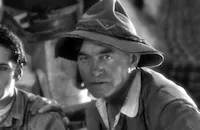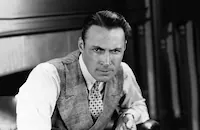Beyond Tomorrow

Brief Synopsis
Cast & Crew
A. Edward Sutherland
Harry Carey
C. Aubrey Smith
Charles Winninger
Alex Melesh
Maria Ouspenskaya
Film Details
Technical Specs

Synopsis
Engineers and business partners Michael O'Brien, Allan Chadwick, and George Melton are wealthy but lonely old men. Faced with spending Christmas Eve alone in their New York mansion, good-hearted Michael suggests that they drop three wallets, each containing a ten dollar bill and one of their business cards, out their window and ask whomever returns them to stay for dinner. Although cynical George is certain that no one would return a wallet containing cash, struggling Texan James Houston and young clinic worker Jean Lawrence both return the wallets they find. Jimmy and Jean fall in love over dinner and soon become inseparable from Michael, Allan and George, who reveal in their company, until the three gentlemen tragically perish in a plane crash. After the accident, the three men return as ghosts, but only their faithful Russian housekeeper, Madame Tanya, senses their presence. Michael has bequeathed Jimmy some bonds with which he launches his singing career. Because of the strange circumstances connected with his inheritance, Jimmy receives much publicity, thus attracting the attention of seductive radio radio star Arlene Terry. Becoming infatuated with Arlene, Jimmy soon begins to neglect Jean. Michael, watching helplessly as Arlene ensnares Jimmy, pleads with him to return to Jean, but his entreaties are in vain because Jimmy cannot hear him. When Arlene convinces Jimmy to go away with her for a weekend, Michael asks Tanya to intercede, but Jimmy refuses to heed her advice. Soon after George is taken to the nether world and Allan is called to heaven by his son David, a solider killed in World War I. Michael is also called to heaven but refuses to go becauses he senses trouble and wants to help Jimmy, even if it means he is destined to wander the earth for eternity. Michael's instincts prove correct when Arlene's jealous, estranged husband fatally shoots Jimmy in a country inn. Jimmy is rushed to the hospital, where his heart stops beating on the operating table. Now dead, Jimmy is able to see Michael. When Jimmy sees Jean crying for him, he finally realizes that he has made a mistake and Michael intercedes with a voice from above to give Jimmy another chance. Jimmy's heart then begins to beat again, and with Jimmy's happiness now assured, Michael also ascends to heaven, accompanied by George, who is now ready to join his friends.

Director
A. Edward Sutherland
Cast

Harry Carey

C. Aubrey Smith

Charles Winninger
Alex Melesh

Maria Ouspenskaya

Helen Vinson

Rod La Rocque

Richard Carlson

Jean Parker
J. Anthony Hughes
Robert Homans
Virginia Mcmullen
James Bush
William Bakewell
Hank Worden
Nell Craig
Crew
Howard Anderson
Adele Comandini
Adele Comandini
Adele Comandini
Jack Cosgrove
Mildred Cram
Edwina
Lee Garmes
Stephen Goosson
Hal Hall
Babs Johnstone
Otto Ludwig
Ned Mann
Jack Murton
Joseph H. Nadel
Charles Newman
James Potevin
Harold Spina
Robert Stillman
Frank Tours
Lester White
William Wilmarth
Adolph Winninger

Videos
Movie Clip




Film Details
Technical Specs

Articles
Beyond Tomorrow
Three wealthy but lonely older men, Melton, Chadwick and O'Brien, invite two young strangers to dinner on Christmas Eve. The two guests fall in love and become friends with their three benefactors. The three rich industrialists are killed in a plane crash but continue their interest in unfinished earthly matters. The young man becomes an overnight sensation as a radio singer and falls under the spell of a glamorous Broadway actress. The ghosts then take it upon themselves to reunite him with his true love.
Beyond Tomorrow was produced by the highly respected cinematographer Lee Garmes. It was not unusual for directors, actors, even writers to become their own producers. But it is rarer to see a cinematographer take up that part of the business. But then Garmes was no run-of-the-mill cameraman. He was among the handful of cinematographers who raised motion-picture photography to an art in the 1920s and 1930s. His lighting techniques contributed tremendously to the appeal of the three movies he did for director Josef von Sternberg and star Marlene Dietrich: Morocco (1930, for which Garmes earned his first Oscar® nomination), Dishonored (1931), and Shanghai Express (1932, his first Academy Award). In pictures since 1918, Garmes's work includes Scarface (1932), Gone with the Wind (1939, for which he received no on-screen credit), Since You Went Away (1944, for which he was again nominated), The Secret Life of Walter Mitty (1947), Detective Story (1951), and The Desperate Hours (1955). His last Oscar® nod was for The Big Fisherman (1959). His producing career, however, was brief, and the pictures he made were far less successful, including a musical romance The Lilac Domino (1937), a collaboration with writer-director Ben Hecht set in the world of classical dance, Specter of the Rose (1946), and uncredited work on a little-known comic western, Shame, Shame on the Bixby Boys (1978), released the year of his death.
Beyond Tomorrow provided a showcase for a number of veteran performers. Harry Carey was a silent film star, in pictures since 1910, who kept his career going as a B-movie western player and A-list character actor in the sound era up through the late 1940s. John Ford dedicated his film Three Godfathers (1948) to the then recently deceased Carey, who had starred in two earlier versions, one in 1916 and another in 1919, directed by Ford himself. His son Harry Carey, Jr. became part of Ford's famous stock company and played in the 1948 remake. Father and son's sole movie together was Howard Hawks's Red River (1948), one of three movies released after Carey Sr.'s death.
Charles Winninger's cherubic face graced many a picture in his long career from 1915 to 1960, including Nothing Sacred (1937), Destry Rides Again (1939), and State Fair (1945). His best-known role, which he created on Broadway before playing in the first film version, was as Cap'n Andy in Show Boat (1936).
C. Aubrey Smith was one of Hollywood's most enduring character actors and supporting players, the very essence of the long-faced, distinguished stereotypical Englishman. Already over 50 when he began his film career in 1915, his amazing longevity and ability to convey his specific type of stock character in a wide range of stories carried him through more than 100 pictures up to his last, at the age of 85, Little Women (1949). When he wasn't busy standing up for the Empire in such films as Clive of India (1935) and The Four Feathers (1939), he could be seen supporting the likes of Katharine Hepburn in Morning Glory (1933), Jean Harlow in Bombshell (1933) and China Seas (1935), and Irene Dunne in the war melodrama The White Cliffs of Dover (1944), his upper lip stiff for another dark time in English history.
In addition to the three leads, the film gave meaty roles to the great Maria Ouspenskaya, whose career stretched back to the early 1900s and her stage work with the legendary Stanislavski, and Rod LaRoque, a major player of the silent era and husband of another silent film star, Vilma Banky, from 1927 until his death in 1969.
Director: A. Edward Sutherland
Producer: Lee Garmes
Screenplay: Adele Comandini, story by Comandini and Mildred Cram
Cinematography: Lester White
Editing: Otto Ludwig
Art Direction: Stephen Goosson
Original Music: Harold Spina
Cast: Harry Carey (George Melton), C. Aubrey Smith (Alan Chadwick), Charles Winninger (Michael O'Brien), Richard Carlson (James Houston), Jean Parker (Jean Lawrence).
BW-84m.
by Rob Nixon

Beyond Tomorrow
Quotes
Trivia
Notes
The working title of this film was And So Goodbye. After the opening credits, there is a written foreword containing the following quotation from Benjamin Franklin. "I believe-that the soul of man is immortal and will be treated with justice in another life. respecting its conduct in this." According to the Variety review, the film was the first picture produced by Lee Garmes' Academy Productions.














